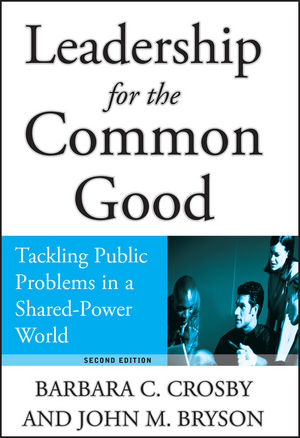Leadership for the Common Good: Tackling Public Problems in a Shared-Power World, 2nd EditionISBN: 978-0-7879-6753-6
Hardcover
496 pages
January 2005, Jossey-Bass
 This is a Print-on-Demand title. It will be printed specifically to fill your order. Please allow an additional 10-15 days delivery time. The book is not returnable.
|
||||||
--Harlan Cleveland, author, Nobody in Charge: Essays on the Future of Leadership, and president emeritus, the World Academy of Arts and Sciences
"This important book provides strategies for converting public
ideas into necessary public action. It will help leaders in every
arena to renew our collective commitment to the common good, one of
our most urgent responsibilities to the future."
--Robert H. Bruininks, president, University of Minnesota
"With this book Barbara Crosby and John Bryson again set the
standard for modern considerations of public leadership. They have
it exactly right in their claim that the best of contemporary
leadership involves getting things done by sharing power."
--H. George Frederickson, Edwin O. Stene Distinguished Professor of
Public Administration, University of Kansas, and author, The
Spirit of Public Administration
"Crosby and Bryson describe why we live in a ‘no one in
charge’ world and how we can effectively lead in it. And this
is not just any kind of leadership, but collaborative leadership to
make sure we get to the twenty-second century whole and
humane."
--Barbara J. Nelson, dean, UCLA School of Public Affairs
"Barbara Crosby and John Bryson show how, where, when, and why
to bring diverse groups together to rethink and re-envision what is
possible in order to advance the common good. We can have a
better world!"
--Gary L. Cunningham, director, African American Men’s
Project; director, Primary Care for Hennepin County; and CEO, North
Point Health and Wellness Center
"Crosby and Bryson provide the practical examples that show how the principles involved in leading for the common good can be applied to real-world problems where shared leadership within and across organizations is a critical determinant of effective social change.",br> --Michael D. Mumford, professor of psychology, University of Oklahoma, and editor, The Leadership Quarterly



